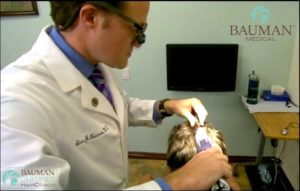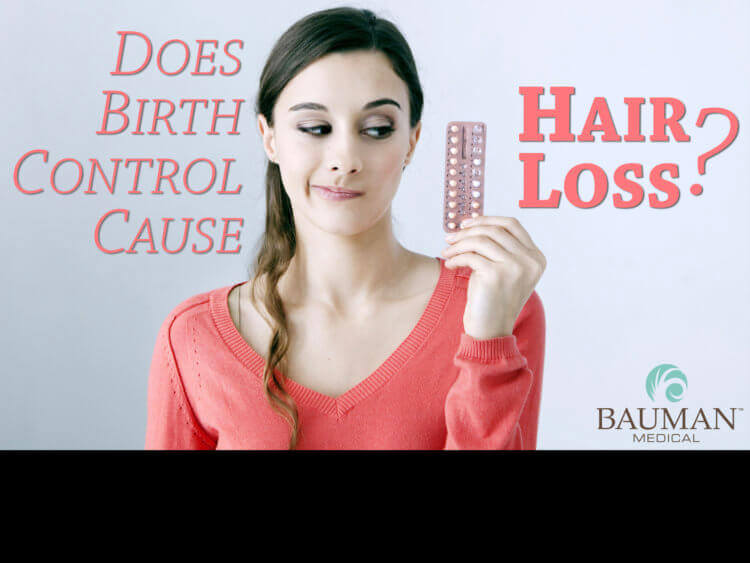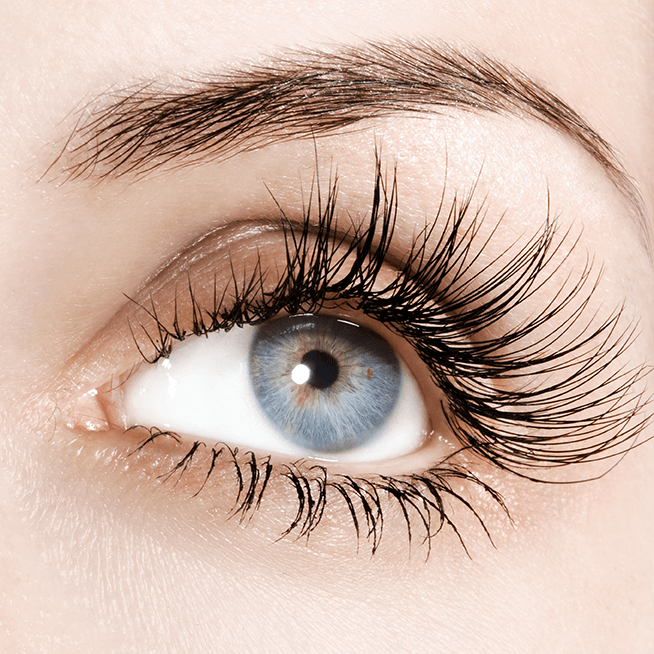Does Birth Control Cause Hair Loss?
–Dr. Alan Bauman, MD, ABHRS, IAHRS, FISHRS
According to the CDC, more than 99% of sexually active women between the ages of 15 and 44 have used at least one form of birth control. For a little more than 25% of these women, oral contraceptive pill is their method of choice, with 10% using an IUD.
Similar to any medication, birth control can cause unwanted side effects. Many women complain that hair thinning, shedding, receding, as well as other hair loss symptoms and changes in hair quality occur while taking the pill. Others may notice increased hair loss when stopping the pill. For some, hair loss from birth control is a temporary side effect that is not concerning, for others it becomes the “trigger” that reveals an underlying, unwanted, distressing tendency toward thinning/shedding hair, receding hairlines/temples, and-or other hair loss issues that is known to run in the family.
More hair shed in the shower, brush or bedding, loss of hair volume, widening part-lines, receding hairlines, hair breakage, oily/dull/dry/limp/frizzy hair, and-or more scalp shining through the frontal or crown areas are all common hair loss symptoms that can be caused or exacerbated by changes in hormones related to birth control.
At Bauman Medical, each year we see a large number of women seeking evaluation and treatment who are concerned about birth control related hair loss.
If you think your hair loss symptoms might a side effect related to starting or stopping birth control, learn more about your hair loss risks and what can be done about birth control-related hair loss. Birth control pills alter your body’s natural hormone levels and this can become a problem for hair growth in patients who are sensitive to changes in hormones. The use of birth control, stopping birth control, giving birth, peri-menopause, menopause and having a hysterectomy are all associated with changes in hormone levels that may trigger or exacerbate hair loss, shedding and hair thinning in women as well as other hair quality changes.
Frequently Asked Questions about Birth Control and Hair Loss
1. How Do Birth Control Pills Work?
Birth control pills typically contain the hormones estrogen and progestin. Birth control pills block the surge in estrogen that normally causes an egg to be released from the ovary, thicken the mucus around the cervix—making it harder for sperm to swim up to the egg, and also thin the lining of the uterus preventing an fertilized egg from implanting.
Other forms of birth control such as patches, implants, shots and vaginal rings also release hormones to stop ovulation and prevent pregnancy which can also cause changes in hair quality as well as hair thinning and hair loss.
2. What Are Common Side Effects of Birth Control?
For many women, birth control pills don’t cause any side effects. Some women experience mild side effects in addition to or other than hair loss such as acne, weight gain/weight loss, irregular periods, spotting between periods, nausea, moodiness, decreased sex drive, headaches, breast tenderness or soreness, etc. Serious side effects can include high blood pressure, slightly increased risk of breast, cervical or liver cancer, as well as an increased risk of blood clots in your leg or lung. Birth control pills that have a higher androgenic and lower estrogen effect are more likely to cause hair loss, unwanted hair growth and acne side effects. Progestin with higher androgenic effects tend to produce less breast tenderness, bloating and mood changes.
3. What Women Are At-Risk for Birth Control-Related hair loss?
Many women are sensitive to the hormones contained in the pill and-or have a strong family history of hormone-related hair loss. Other factors such as poor diet, poor sleep, other medications, significant stress, illness, surgery, etc. can also affect hair follicle function. Hormonal changes and other risk factors can cause sudden hair loss as well as accelerate hereditary hair loss.
4. How Does Birth Control Cause Hair Loss and Changes in Hair Quality?
 A normal, healthy hair follicle will cycle on and cycle off over time. During the growing phase (Anagen Phase), which lasts on average two to seven years, a hair fiber is produced. After this time the hair follicle degenerates (Catagen Phase) and rests for about three months (Telogen Phase) before starting to grow a new hair fiber. At some time between the resting and the growing phase, the “old” hair fiber is ejected from the follicle and is shed as the new fiber grows in. Because we normally have between 100,000 to 150,000 hair follicles on our scalp, it is normal to see about 100-200 hairs shed per day.
A normal, healthy hair follicle will cycle on and cycle off over time. During the growing phase (Anagen Phase), which lasts on average two to seven years, a hair fiber is produced. After this time the hair follicle degenerates (Catagen Phase) and rests for about three months (Telogen Phase) before starting to grow a new hair fiber. At some time between the resting and the growing phase, the “old” hair fiber is ejected from the follicle and is shed as the new fiber grows in. Because we normally have between 100,000 to 150,000 hair follicles on our scalp, it is normal to see about 100-200 hairs shed per day.
Birth control or other sudden hormone shifts or imbalances can cause a large number of follicles to enter their resting phases too soon, causing an increase in daily shedding. This increase in shedding can lead to an acceleration of hereditary hair loss otherwise known as female pattern hair loss.
Hormonal birth control methods like hormone injections (Depo-Provera), patches (Ortho Evra), progestin implants (Norplant), vaginal rings (NuvaRing), IUDs as well as hormone replacement pellets have also been reported to cause and-or accelerate hair loss.
For many women, hair loss from starting or stopping birth control is the trigger that “reveals” an underlying tendency toward hair thinning that may run in the family. Hereditary hair loss may become noticeable at any age after puberty and typically gets worse with time without treatment.
Are there “better” birth control options that don’t have a strong hair loss risk?
When considering birth control, think about your family history and always consult with your physician. If there is a tendency toward hair loss or thinning hair in your family (either side), you may be running the risk of hair loss with birth control. If hair loss runs in the family look for birth control pills that contain more estrogenic effects than progestin, with a lower “androgenic index.” Androgens are considered “male hormones” but they are also naturally produced in women and are naturally present in higher amounts than estrogens. One of the main roles of androgens in women is to be converted into estrogens.
Each birth control pill has its own androgen-index which helps rank various birth control pills based on their their tendency to create androgen effects in a woman’s body. If you have a known sensitivity to androgens, high levels of androgens or have experienced androgen-related side effects such as acne, hirsutism (hair growth in inappropriate places) and-or hair loss/hair thinning, you should choose a pill with a low androgen index.
Every patient is different, and the choice of pill should be made with your healthcare provider.
4. High Vs. Low Androgen/Androgenic, Estrogen/Estrogenic, Progestin, etc. Birth Control Pills
Birth control pills that contain a high androgenic/low estrogenic pattern include: Alesse, Estrostep FE, Levlen, Loestrin 1.5/30, Loestrin 1/20 Fe, Ovral.
Birth control pills that contain a higher estrogen, higher progestin and lower androgen potency include: Demulen 1/50, Desogen, Ortho-Cept, Ovcon 50. Yasmin, Zovia 1/50E, Estrostep Fe.
Birth control pills that contain lower estrogen, higher progestin, higher androgen potency include: Demulen 1/35, Levlen, Levora, Loestrin 1.5/30, Loestrin 1/20 Fe, LoOvral, Nordette, Zovia 1/35E
Others: Brevicon, Mircette, Modicon, Necon, Otho-Cyclen, Ortho-TriCyclen, Yasmin.
5. How Can We Measure Hair Growth or Hair Loss Changes Due to Birth Control?
 In addition to standardized medical photography and microscopic evaluation of the scalp, new scientific tools like the HairCheck device allows a quick, non-invasive way to quantify the amount of hair growing in several areas of the scalp—without having to trim your hair. The HairCheck cross-sectional hair bundle trichometer is used by hair loss experts worldwide and its backed by numerous clinical trials and years of use in clinical settings. HairCheck instantly measures the quantity and quality of hair in a given area of scalp—even more sensitive and more accurate than a pure density measurement. If you are concerned about shedding or other hair loss symptoms, the best way to measure your hair’s progress is a HairCheck measurement every three months. At Bauman Medical, we’ve performed over 40,000 HairCheck measurements for our patients to help diagnose and track their hair loss and hair regrowth.
In addition to standardized medical photography and microscopic evaluation of the scalp, new scientific tools like the HairCheck device allows a quick, non-invasive way to quantify the amount of hair growing in several areas of the scalp—without having to trim your hair. The HairCheck cross-sectional hair bundle trichometer is used by hair loss experts worldwide and its backed by numerous clinical trials and years of use in clinical settings. HairCheck instantly measures the quantity and quality of hair in a given area of scalp—even more sensitive and more accurate than a pure density measurement. If you are concerned about shedding or other hair loss symptoms, the best way to measure your hair’s progress is a HairCheck measurement every three months. At Bauman Medical, we’ve performed over 40,000 HairCheck measurements for our patients to help diagnose and track their hair loss and hair regrowth.
7. What Can be Done to Treat Birth Control Related Hair Loss, Hair Shedding and Other Hair Quality Changes?
The good news is that in addition to adjusting your birth control regimen, there are many effective treatment options that can help protect and improve the functioning of your hair follicles. Keeping follicles in the “Anagen” or growth stage is the main goal of many medical treatments for hair loss. Sophisticated compounded prescription topical medications, like Formula 82M Minoxidil for example is more powerful and less greasy/gooey than common over-the-counter versions. Because it’s less irritating / less troublesome to use and it has such a powerful hair regrowth effect, this rogaine-alternative is the most popular prescription version of topical minoxidil in the U.S.!
Other treatments such as Low-Level Laser Light Therapy in the form of hands-free, portable, cap-type devices are FDA-cleared for hair growth and safety. These non-drug options when used appropriately and consistently can have a dramatic effect on hair growth and hair quality. Physician-strength devices such as CapillusRX-315 and LaserCap-224 are doctor-prescribed and dispensed laser therapy devices which have an excellent track-record of success.
One of the newest treatments is PRP or Platelet-Rich Plasma. Light-activated or Photo-activated PRP which involves the activation of high-concentrate PRP using a multi-wavelength device just prior to application of the PRP to the thinning areas of the scalp.
Nutritional interventions include the use of B-complex multivitamins, megadose Biotin or B-7 (SuperBiotin) as well as specialty nutraceuticals such as ViviscalPRO and-or Nutrafol which are available from Bauman Medical.
For a complete birth control hair loss evaluation, hair loss risk assessment including hair density measurements with HairCheck and HairCam devices, please contact Dr. Alan Bauman for an in-person consultation or start your online virtual consultation today.
If you or someone you know has hair loss, hair thinning, baldness, or eyebrow / eyelash concerns, click to start either a long-distance virtual consultation OR an in-person, in-office consultation with Dr. Bauman. You can also Ask Dr. Bauman a Question or simply call Bauman Medical Group at +1-
*Each individual's treatment and/or results may vary




 ARTICLE: Losing Your Hair? Check Your Medicine Cabinet
ARTICLE: Losing Your Hair? Check Your Medicine Cabinet South Florida Health & Wellness Magazine “Vampire PRP for Hair Regrowth Treatment” article features Dr Bauman
South Florida Health & Wellness Magazine “Vampire PRP for Hair Regrowth Treatment” article features Dr Bauman LaserCap Receives FDA Clearance
LaserCap Receives FDA Clearance Dr. Alan J. Bauman, M.D.Hair Loss & Hair Transplant ExpertBoca Raton, FL
Dr. Alan J. Bauman, M.D.Hair Loss & Hair Transplant ExpertBoca Raton, FL






